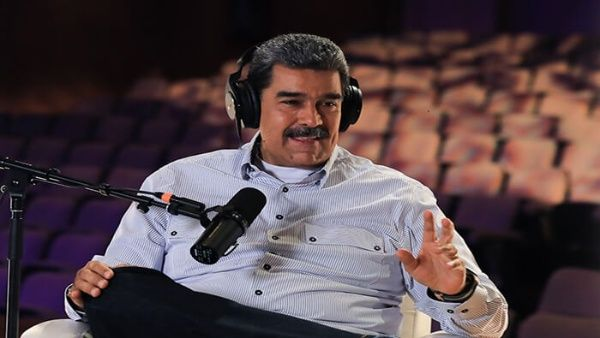
Caracas, May 13 (RHC)-- Venezuelan President Nicolás Maduro says that the Bolivarian Revolution and the people have identified a paradigm of revolutionary information to overcome the censorship of the hegemonic media, and make known the reality and recovery of the country.
During the eleventh edition of the Maduro Podcast, in which he had Brazilian political analyst Diego Ruzzarin as a guest, the head of state assured that communications is in the streets and from there it is articulated in defense of sovereignty.
He explained that the hegemonic media does not want the truth to be known, that the country is recovering, that no one is stopping it despite the more than 930 sanctions and measures imposed by the U.S. and Europe, and that the people are mobilizing in function of productive dynamization, well-being, security and peace.
He assured that, faced with this obstacle, it became a programmatic task to document the events of the revolutionary achievements and disseminate them through social networks, in a system that he identified as "Streets, Networks, Media and Walls" -- a course of action that will contribute to defeating the information blockade.
He questioned that imperialism and the media at its service are distorting the presidential elections set to take place on July 28th to prevent its normal procedure.
"It seems that the president of the world is being elected and not the president of Venezuela," he stated, and explained that this is motivated by the desperation of the gringo empire, "with its hatred, with its desire to come and put its claws on Venezuela, for oil, gas, gold, wealth and to destroy Bolívar's revolution, Chávez's revolution."
The Bolivarian leader rejected the colonialist model that seeks to impose itself in Latin America in the 21st century. He assured that it contradicts the advances in integration between nations during the last two decades and the dignification of the social rights of peoples.
Faced with this advance of the colonialist right and neoliberalism, he noted that the people are open to two alternatives: "Either they are the [Argentinian president] Milei, or we are the humanists, those of us who want a different future of optimism and hope," he said.
When referring to the model of fierce neoliberalism that is being applied in Argentina, he expressed that with President Javier Milei "a chainsaw has arrived to cut the necks and hands of the people of Argentina, even at levels never before seen of surrender of the territory, delivering land for U.S. military bases.
He stated that "not even the worst dictatorships, like that of (Jorge Rafael) Videla, dared to take away all rights to culture, put an end to advanced science and technology with the educational system, with the transportation system, with the social Security."
Brazilian political analyst Diego Ruzzarin recalled that, under Milei's management, Argentina voted for the first time against the rights of Palestine, which he considered an absolute shame.
After that vote at the United Nations, President Maduro described the Argentinian president as a coward who "has become and will remain in history the great accomplice of the genocide against the Palestinian people. That will be written. Javier Milei is a supporter of genocide. It will be written in history and future generations."
And he added that leaders like Milei, or the former Brazilian leaders (Jair) Bolsonaro, and the Colombians (Álvaro) Uribe and (Iván) Duque "are supporters of Zionism and the most recalcitrant sectors of the power of the United States."
Among other ideas, the Venezuelan president emphasized that with equality and social justice as principles, "Our America is heading towards full articulation with the new world that is emerging," which he valued as "a more humane and supportive world, based on new methods of cooperation between the Latin American and Caribbean peoples."

